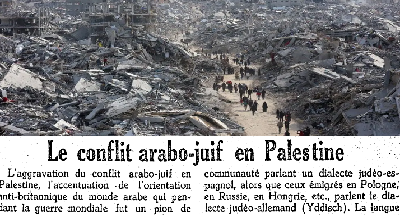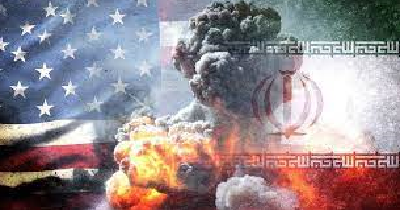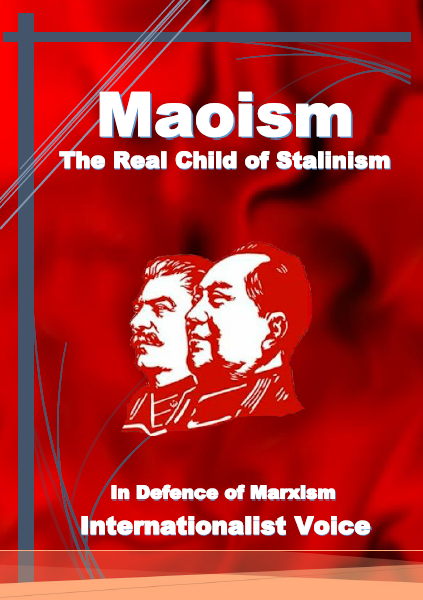The imperialist war in Ukraine and the tasks of the revolutionaries
- The horrors they try to accustom us to with the war in Ukraine day after day constitute the true nature of capitalism. The thousands of deaths that are piling up week after week, mainly among defenceless civilians as well as young Russians and Ukrainians sent to kill themselves under martial law, entire cities completely destroyed by a deployment of first-rate weapons, millions of refugees of women, children and the elderly seeking refuge, often stricken themselves in their flight or stranded hungry and without resources in dark basements. Capitalism thus shows, once again, its true face, a face of death and destruction that belongs to all countries, large and small, so-called aggressors and aggressed.
- In order to drag the proletarians into the atmosphere of war, Western propaganda does not hesitate to emphasise the question of defending the aggressed people from the invader. Not a day goes by that Zelensky does not appear on television to call for new weapons to defend himself. Wars change, times change, but the bourgeoisie never gives up trying to pass off its interests as those of the people as a whole, its wars as wars of national defence. It did so in World War II when it called for partisan struggle against fascism and Nazism, and it did so in World War I when every single belligerent country declared that it was the aggressed country and that it had to respond to the aggressor. Today, the scenario is repeated unchanged. The same powers that try to present themselves as the defenders of the aggressed Ukraine, mainly the USA and European countries, are themselves the aggressors, provoking Russia by removing the various countries of the former Soviet area from its influence and annexing them to NATO, a purely military alliance. The Ukrainian state itself does not cease to demand the slaughter of thousands of men forced not to leave the country to serve the homeland, i.e. the interests of Ukrainian imperialism.
- The gravity of this war, which brings the conflict back to the heart of Europe, directly involving Russia and Ukraine, the two largest countries on the continent, and with NATO and the USA immediately behind it and China in the background, plus the risk of nuclear accidents or even the use of nuclear weapons, certainly needs no explanation. On the other hand, the situation is particularly delicate for the proletariat, which at this stage finds itself overwhelmed by events and even finds it difficult to recognise itself as a social class exploited by this system. Faced with this scenario, revolutionaries cannot wait for the proletariat to awaken, they must take the initiative and assume their responsibilities. But what are the tasks of the revolutionary vanguards today? To answer this question we must look back at the history of the workers’ movement.
- And of course the most immediate reference can only be Zimmerwald. What animated the participants at the Zimmerwald Conference in September 1915 was the denunciation of war as an expression of the barbarism of capitalism, unmasking and denouncing the defensive positions of one camp or the other one in the struggle, without falling into the trap of defending one or the other. It is not appeals for peace to the world’s powerful that will stop the war, but the class response to capitalist barbarism through the transformation of imperialist war into class war to overthrow the system, as Lenin and Luxemburg already demanded at the Seventh Congress of the Second International in Stuttgart in 1907. This spirit of uniting on principles despite differences in analysis will allow Zimmerwald to become the reference point for us revolutionaries today. And it was precisely with regard to Zimmerwald that Lenin himself, known for his intransigence, developed the following considerations about the Zimmerwald Manifesto immediately after the conference:
“Should our Central Committee have signed this fearful and inconsistent manifesto? We think so (…). We have not concealed our opinions, our words of order, our tactics. (…). We have spread, we are spreading and we will continue to spread our opinions with the same energy with which the manifesto will spread them. It is a fact that this manifesto is a step towards a real fight against opportunism, towards a break with it. It would be sectarian to refuse to take this step forward together with the minority of German, French, Swedish, Norwegian and Swiss socialists, when we have full freedom and full opportunity to criticise incoherence and work for greater things. It would be a bad war tactic to refuse to join the growing international movement of protest against social-chauvinism just because this movement is slow, because it is “only” taking a step forward and because it is ready and willing to take a step back tomorrow and make peace with the old International Socialist Bureau.”[1]
As can be seen from this passage by Lenin, the differences between the revolutionaries of the time never prevented them from taking positions in common, even though they continued to polemicize each other. In April 1915 Rosa Luxemburg wrote Junius brochure and Lenin in 1916 polemicized Rosa with Imperialism, the supreme phase of capitalism. Therefore, a joint statement is neither a substitute for nor an impediment to a discussion and confrontation between revolutionaries, it can rather be a stimulus.
- So, in relation to the current situation, what tasks do revolutionaries have today? We think that, on the track of what has been expressed by the previous generations of revolutionaries, a first task is to develop the most lucid analysis possible of the current events, confronting and polemicizing with other positions present in the revolutionary camp in order to promote the maximum clarity that the proletariat needs at this moment. However, a second task, not secondary to the first one, is to express with one voice the denunciation of the capitalist barbarism of the war by the various internationalist organisations, starting with those that are the expression of the legacy of the communist left. In this sense, the ICC has promoted an appeal to these organisations to draw up a joint declaration condemning the war, to say what the position of the proletariat is in the face of the current situation, to affirm the need to defend internationalism in the face of imperialist war. As you know this declaration has been signed for the moment by three other organisations worldwide: the Onorato Damen Institute, Internationalist Voice and International Communist Perspective (Korea). However small the number of groups that have signed the declaration against the war, the enormous importance of this declaration for the future of the class struggle must not escape our attention. In the case of the Zimmerwald Manifesto, which was addressed to proletarians throughout Europe and unanimously adopted by socialists in twelve countries, it had a major impact on workers and soldiers. Translated and distributed in several languages, mostly in the form of leaflets and underground pamphlets, the Manifesto appeared as a living protest of internationalists against barbarism. In the face of the gravity of the situation, the ambiguities contained in the Manifesto became secondary in the minds of the workers who saw in it the first manifestation of internationalism. We must therefore defend and strengthen this Common Declaration, which is only the first act, the first nucleus of activity around which it will gradually be possible to aggregate other revolutionary forces in the clarity of their reciprocal positions towards the construction of the future party.
- It is also necessary to point out that, if the organisations that responded positively are only three, it is because others either did not respond (PCI – Le Proletaire and PCI – The Party) or responded negatively (PCI – The Programme and the TCI). In particular, while Il Programma declined the invitation saying that:
“this is not the time for talk, but for putting into practice the unchanged and unchanging directives of revolutionary preparation”
the TCI gave the following answer:
“In the past we have always found that our perspectives are completely different and make any deeper joint statement impossible and this has become even more pronounced over time. So although we are not in principle opposed to some form of joint declaration, we may find the same old problems.”
To add shortly afterwards: “… it may also be necessary to look beyond the ‘communist left’ (which despite our recent growth remains sadly small) but to those who share our class perspective if not our precise politics. The slogan “NO War But the Class War” not only poses this question to other political groups but brings them even closer to the perspective of the communist left.”
- In fact, the rejection of the TCI goes hand in hand with adherence to grassroots initiatives that do not, in our opinion, correspond to the needs of the moment. We think that these groups, by refusing to adhere to the call for a common initiative between the forces of the communist left, are departing from the tradition of the workers’ movement and specifically of the communist left, which had its origins in Zimmerwald. We therefore propose that the discussion should focus in particular on this initiative of the Common Declaration and what it entails, and that the discussion itself should be a moment of preparation for the struggle, mutually evaluating how best to use this process of common action to amalgamate, with the revolutionary organisations that are members today, also the availability of individual comrades.
International Communist Current
Instituto Onorato Damen
Internationalist Voice
Internationalist Communist Perspective (Korea) fully supports the joint statement
May 2022
[1] Lenin, The First Step, 11 October 1915, https://www.marxists.org/archive/lenin/works/1915/oct/11.htm














